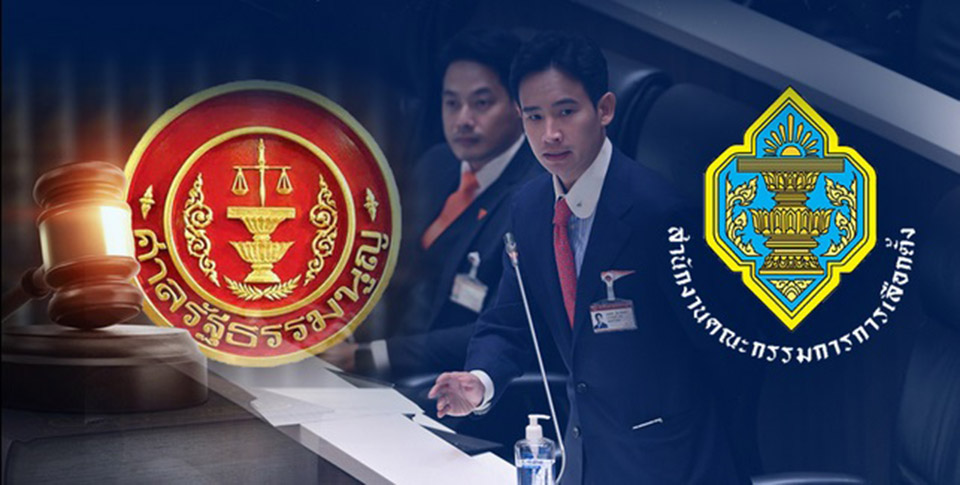Thailand’s joint House and Senate session on Wednesday rejected Pita Limjaroenrat’s nomination for prime minister since a parliamentary rule prohibits it, according to Parliament President Wan Muhamad Noor Matha
At around 5.10 p.m., 715 lawmakers cast their votes electronically, and Mr. Wan then made the announcement. After a protracted discussion about the matter that began shortly after the meeting’s opening at 9.30am, the parliament president called for a vote.
In the combined session, 394 lawmakers, the majority of them unelected senators, voted against Mr. Pita’s renomination, 312 lawmakers supported it, eight lawmakers abstained, and one legislator did not cast a ballot.
Mr. Wan claimed that the rejection was by majority vote because 374 votes, or half of the total, were cast during the joint sitting. After Mr. Pita was relieved of his MP duties earlier in the day by the Constitutional Court, the figure was revised.
After the vote, Mr. Wan adjourned the meeting. He set the Pheu Thai Party’s likely candidate proposal for July 27 as the date for the next effort to select a premier. Srettha Thavisin, a businessman, is the most likely candidate, but the coalition’s makeup may change.
Many senators continue to view the progressive Move Forward Party’s inclusion in the eight-party coalition alongside Pheu Thai as a deal-breaker. The Pheu Thai candidate will not have a second chance if he or she does not win a majority.
A vote to prevent Mr. Pita’s renomination, he said on Tuesday, would create a dangerous precedent for the legislature.
Parliamentarians debated the admissibility of the renomination for hours before to the vote.
According to the motion’s detractors, parliamentary session regulation No. 49 forbade resubmitting a defeated motion to the parliament during the same parliamentary session. They claimed that since Mr. Pita’s candidature was turned down last week, there was no reason to submit it again.
Parliamentarians who supported Pita highlighted that the rule only applied to general resolutions and not to the selection of the prime minister. It was a nomination, not a motion, they claimed. Additionally, they stated that lawmakers should respect the decision that voters made in the general election on May 14.
Following the voting, a number of senators and members of parliament fled the building by boat from the back of the complex to stay away from the crowd of demonstrators assembled in front.
With 151 House seats, Mr. Pita’s Move Forward Party won the election, which cost the tax payers 6 billion baht. He recently declared that if his campaign for prime minister failed, he would allow the Pheu Thai Party to do so.
The two parties that make up the present partnership are Pheu Thai, which obtained 141 seats in the House.
Thailand’s Constitutional Court Suspends Pita
Pita Limjaroenrat, the head of the Move Forward Party and a candidate for prime minister, was removed from his duties as an elected member of the House of Representatives by the Constitutional Court on Wednesday morning.
After learning of the court’s announcement, Mr. Pita started leaving the room where lawmakers were debating legal nuances pertaining to his renomination as prime minister.
Mr. Pita held out his MP card and waved to the lawmakers from his Move Forward Party.
But after MFP MP Wiroj Lakkhanaadisorn pointed out that he should hold off until he receives an official advising letter from the Constitutional Court, the speaker went back to his seat.
About 150 Pita supporters came up to the parliament gate and showed their displeasure outside. A few protesters hurled water bottles towards the fence. Inside the gate, queues of crowd control officers formed.
At 2:43 PM, Mr. Pita informed the legislature that he would be leaving the chamber due to the court’s suspension order. The parliament president commended him for abiding by the rules, and MPs applauded him.
“I’d like to take this opportunity to bid the president of the parliament farewell until we meet again,” Mr. Pita remarked. I want my colleagues lawmakers to use the legislature to look out for the needs of the populace. Thailand, in my opinion, has changed since May 14. Even if I haven’t done my duty, I implore my fellow members to work together to take care of the people because even if they’ve won half the battle, they still have to win the other half. I sincerely appreciate that, Mr. President.
After removing his MP identity card from his jacket and setting it on the table in front of his seat, he left the room.
To the applause of his fellow MPs, the 42-year-old raised his fist as he departed the assembly floor.
After taking a complaint involving Mr. Pita’s inherited shares in the now-defunct media business iTV Plc for consideration, the court made the announcement.
The constitution forbids lawmakers from owning shares in media companies. The 42,000 shares, according to Mr. Pita, were a part of his late father’s estate, which he oversaw in his capacity as executor. According to him, relatives now have the title.
The joint sitting was debating his nomination for prime minister on Wednesday, therefore the suspension has no bearing on that. Last week, the case made it to the Constitutional Court’s headquarters.
Due to his ownership of a media firm, the Election Commission had urged to the court that Mr. Pita have his MP designation revoked. Additionally, the election body asked the court to remove him from his MP duties until its decision.
The Constitutional Court said on Wednesday that all of its judges have concurred to accept the case.
By a vote of seven to two, it also decided to immediately suspend Mr. Pita from his MP duties until it issued a ruling due to potential legal concerns, objections, and conflicts that would impede the House’s and parliament’s work.
After receiving a copy of the decision, the court asked Mr. Pita to provide his justification within 15 days.





